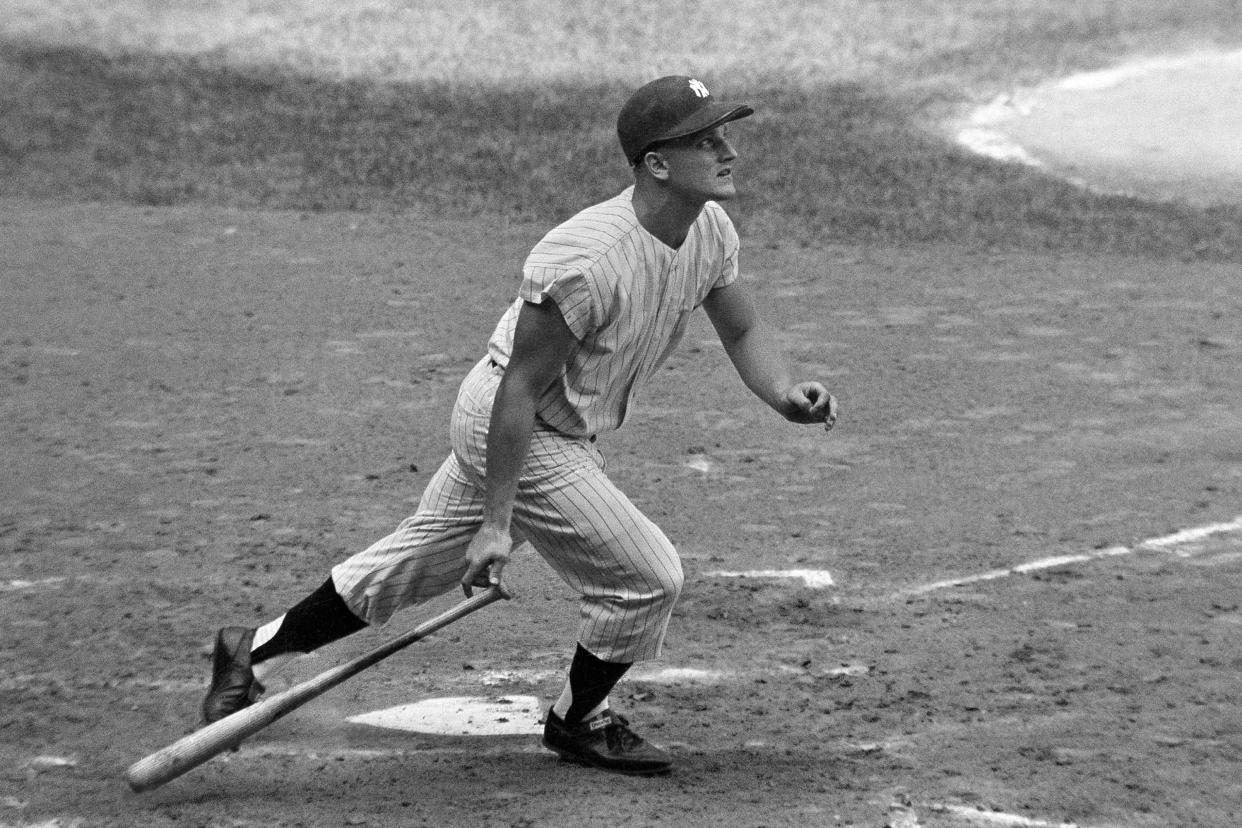Putting Aaron Judge's 2022 season in perspective: Is the Yankees' slugger in Babe Ruth territory?
New York Yankees slugger Aaron Judge is doing something that hasn’t been seen in MLB in nearly two decades. With his 60th home run, Judge put himself in the same company as Barry Bonds, Roger Maris, Mark McGwire, Sammy Sosa and Babe Ruth.
Does Judge’s 2022 season truly belong in the same company as those players? Ruth is arguably the greatest player of all time. Bonds deserves to be in that conversation, though that comes with a major caveat. Maris is a Hall of Famer, and McGwire and Sosa might be if not for performance-enhancing drug suspicions.
Sure, Judge has been excellent, but has be been as good as Ruth? What about Maris? Is there an argument that what Judge is doing is as unique and special as Shohei Ohtani’s two-way brilliance?
Has Aaron Judge reached the heights of Babe Ruth or Barry Bonds?
Putting Judge’s offensive contributions in a historical context isn’t hard. Turns out, that’s exactly what wRC+ measures. The stat sums up a player’s offensive value by comparing it to the league average during that season. wRC+ is ideal for this exercise because it adjusts for a player’s ballpark and the offensive environment he played in. Players who excelled in the dead-ball era — when power barely existed and the league batting average hovered around .241 can be directly compared to players who mashed 45 home runs during the height of the steroid era — when a .270 batting average was closer to the norm.
The stat is also incredibly easy to understand. A player with a 100 wRC+ performed exactly league average on offense during that season. A player with a 150 wRC+ performed 50 percent better on offense than a league-average player.
In 2022, Judge has a 211 wRC+. He’s been 111 percent better than a league average player on offense. There have been 16 other instances in MLB history where a player has put up a wRC+ of 211 or higher. Bonds did it four times in his career. Those seasons all came in a row (2001-2004), which was the last time in MLB a player produced a wRC+ over 211.
Among other 60+ home run seasons, Judge’s 211 wRC+ ranks third. Bonds’ 235 wRC+ from the 2001 MLB season tops the list. Ruth’s 212 wRC+ from 1927, when he set the then-record with 60 home runs, ranks second. The only other player to hit 60+ home runs with a wRC+ over 200 is McGwire in 1998. He hit 70 home runs that season and posted a 205 wRC+.

When Maris broke Ruth’s record in 1961, Maris had a 162 wRC+. Why is Maris’ figure significantly lower? It could partially be due to Maris’ .269 batting average being just a few points above the league average, which was .258 in 1961. By comparison, Judge has a .316 batting average in a season where the league average is .243. Judge’s numbers are a much bigger outlier when you take his era into account.
From a purely offensive standpoint, Judge is having a historic season. There have been only 15 better offensive seasons, according to wRC+. Among players who have hit 60+ home runs, Judge hasn’t reached Bonds’ level, but he’s on par with Ruth’s record-setting season.
How good has Aaron Judge been when he's not hitting?
What if you want to go beyond Judge’s offensive numbers? Is Judge’s season still special when you consider his defense and base running?
That’s also easy to do, but it comes with a major caveat. Judge has a 10.7 fWAR — FanGraphs' version of WAR. The figure is tied for 29th in MLB history. It’s on par, so far, with Ruth’s 1931 season and Willie Mays’ 1965 season. And if Judge avoids a slump down the stretch and keeps performing well, there’s a chance he’ll climb higher on the list by the time the 2022 regular season ends.
Using fWAR comes with a significant flaw. Single-season defensive metrics aren’t that reliable. Judge’s defense has a value of -0.2 in 2022, according to FanGraphs. That means he has been slightly below average as a fielder. Last year, he was worse, posting a -4.5 defensive value. In 2019, however, Judge graded out well as a fielder, posting a defensive value of 6.8.
Those figures show the flaws in relying too much on single-season defensive metrics. Is Judge truly a strong fielder like he showed in 2019? Is he a below-average fielder like he showed in 2021? Or is he roughly average, like the metrics say in 2022? Is Judge’s 2019 skewed because he played only right field? Is Judge’s defensive value being penalized too much in 2021 and 2022 because he’s playing more in center?
FanGraphs acknowledges its version of WAR is not a precise figure. It’s supposed to be used as an estimate of a player’s value.
Evaluating Judge’s entire body of work in 2022 drops his value somewhat, but there’s still a strong argument to be made he’s posting a top-50, maybe even a top-40 season, of all time.
The Shohei Ohtani problem
And then there’s Ohtani. He’s the only player who is doing something on par with Judge in 2022. Ohtani has been excellent at the plate and on the mound, and is posting better numbers than last season, when he unanimously won the AL MVP award.
Ohtani’s two-way status complicates the comparison even more. If you add up Ohtani’s fWAR as a position player and his fWAR as a pitcher, you get an 8.9 fWAR. However, there are major issues with that approach. For one, Ohtani is a designated hitter. He gets penalized in his defensive metrics for not playing the field. That penalty is determined by performing a positional adjustment each season that determines how much designated hitters should be penalized for not fielding. It’s not necessarily a bad way to calculate a designated hitter’s value, but it’s complicated.

The bigger issue is Ohtani’s pitching fWAR. FanGraphs calculates pitching WAR using FIP, or Fielding Independent Pitching. FIP attempts to strip out anything that affects a pitcher once a ball is put in play. It believes pitchers have little to no control once a batter puts a ball in play. FIP also measures how well a player should have pitched, and not necessarily how they pitched. It’s a controversial concept, and one of the main reasons Baseball-Reference has its own version of WAR — bWAR. Baseball-Reference does not use FIP when calculating WAR for pitchers. Baseball-Reference’s version is based on runs allowed and innings pitched. Both websites go into more detail on how those stats are calculated and why they are used. If you use Baseball-Reference’s version of WAR, the case between Judge, 9.9 bWAR, and Ohtani, 8.9 bWAR, is slightly closer.
If you want to argue Ohtani’s two-way ability saves the Los Angeles Angels a roster spot, well, even that isn’t as big of an advantage as it seems. The Angels have to compensate by running out a six-man rotation, which probably hurts the team in the long run.
All of this makes a direct comparison extremely difficult. Both metrics have Judge as the better player in 2022, but the margin for error is close enough that an argument still exists for Ohtani.
MLB fans are witnessing history with Aaron Judge
Any way you break it down, Judge is delivering a historic season. Ohtani is as well, but the media focus and the pursuit of the AL home-run record is providing Judge with the drumbeat necessary to win the AL MVP award. Ohtani's numbers are generational, but MLB isn't cutting into his games to see if he can win his 14th game of the season. Judge is getting that treatment, and has a shot to win the Triple Crown. The pursuit of those milestones draws more attention to Judge, thus making him more likely to take home the AL MVP.
At the same time, it's probably fair to say Ohtani's 2022 has been underrated. Dominant two-way players come along even less often that 60+ home-run hitters, and the fact that Ohtani has been even better in 2022 than he was last season shouldn't be brushed aside so easily.
If Judge wins the award, it will be tough to argue it was the wrong choice. He's delivering the best offensive season MLB has experienced since Bonds' incredible run. It might be decades before baseball fans see this level of offensive production again.
